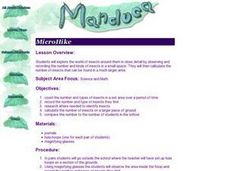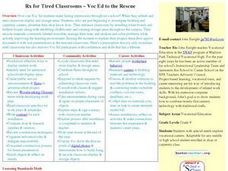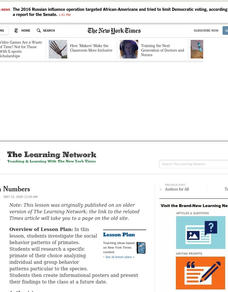Curated OER
Mississippi Gulf Coast Islands
Fourth graders complete a variety of exercises as they study the creation, history, and geography of the Mississippi coastal islands. They discover the natuaral forces that act on the islands and how these forces affect the habitats and...
Curated OER
Building a Telescope
Students construct a simple refracting telescope. They calculate the magnification.
Curated OER
Stick-Slip Movement
Ninth graders operate a model to observe the type of motion that occurs at a fault during an earthquake. They explore the effects of several variables. Students measure movement, calculate averages and plot and graph information.
Curated OER
Career Awareness
Students discuss career possibilities. In this career education lesson, students view presentations from various career areas and discuss workplace requirements. Students list the top few career choices that interest them.
Curated OER
Number Line Mathematics
Students translate problem situations into diagrams, models, and numerals using whole numbers, fractions, mixed numbers, decimals, and percents. They identify that numbers in different forms are equivalent or not equivalent using whole...
Curated OER
Detective Digis and the Computer Caper
Mathematicians participate in an hands-on activity to investigate the binary number system and write messages in binary code and have classmates decipher the messages. A said video on the topic does not seem to be available, but the...
Curated OER
Artists Teach Us to See the World through Visual Symbols
Tenth graders analyze a biographical piece of art by Raymond Saunders. They identify shapes, symbols, and lines that are used, and how the piece relates to the artist's life and modern society. They design and create an original piece of...
Curated OER
Politics and Religion in 17th Century Dutch Art
Seventh graders examine different pieces of Dutch Art. They identify its social and political meanings by using cultural and historical information. They examine maps of the time period as well.
Curated OER
MicroHike
Middle schoolers observe insects in a small area. They calculate the number of insects in a large area as well. They share their calculations and observations with the class.
Curated OER
Rx for Tired Classrooms: Vocational Ed to the Rescue
Secondary carpenters apply their skills to improve display spaces in classrooms at their campus. Includes a contract between workers and teachers who sign on for improvements in the their rooms. Concurrent exploration of building and...
Curated OER
Compass Reading
Here's a basic lesson on reading a compass. Learn the names of the parts of a compass. Learn how to read a bearing in degrees. Then go outside and follow a course of cones set up on the grass or in a clear area. Starting at one cone,...
Channel Islands Film
Lone Woman of San Nicolas Island: Lesson Plan 1
As a practice writing test, fourth graders use the West of the West's documentary Lone Woman of San Nicolas Island and two print resources as source materials for an informative article that identifies information that is historically...
Curated OER
Safe Food Supplies
Students answer the question how are food supplies maintained safely for human consumption? They are able to answer the following questions: what personal and pulic decisions must be made regarding the safe handling of food?, What are...
Curated OER
A Teeth Changing Experience
Students research human health by reading an educational story in class. In this oral health lesson, students identify the importance of brushing their teeth and consuming calcium. Students read the book A Teeth Changing Experience and...
Curated OER
"I Have a Dream"
Students examine the role Martin Luther King Jr. played in America's history and what life was like in the 1960's. They watch and discuss an online video about the childhood of Martin Luther King, Jr. and the holiday enacted in his...
Curated OER
Explore the Ocean
Learners explore the oceans from their origin. In this oceans activity, students read and discuss excerpts from the Book of Genesis regarding the creation of the ocean. Learners then clean up a mock oil spill, measure the volume and area...
Curated OER
Decimals in the Dugout
Students investigate place value and decimals during baseball related activities. In this place value lesson, students explore place value with decimals. Resources are included.
Curated OER
50th Anniversary of Brown v. Board of Education
Students examine a poster of Brown v. Board of Education and discuss what the important details are. They read the story behind the poster and court case. They role play different sections of the case such as the court case or Linda...
Curated OER
Birds, Bees and STDs
Students develop knowledge on STD's, their causes, treatment and prevention. In this investigative lesson students mingle with each-other to find the STD, then get into groups and research STD's on the CDC site.
Curated OER
Safety in Numbers
Students investigate social behavior patterns of primates. Next, students research a specific primate-analyzing individual and group behavior patterns particular to the species. They create informational posters and present findings to...
Curated OER
Battling Bullies
Students identify aspects of a conflict situation through a story. They engage in problem solving or identification of an aspect of bullying. Applying their knowledge of bullying, they create scenarios that reflect their methods of...
Curated OER
Social Studies: African Banner Boxes
Students write creation stories and design stamps to use on banners accompany them. They discuss the use of stamps in African culture to take the place of words. Students use a handout of stamps and their own creations to create banners...
Curated OER
NUMB3RS Activity: Regular Ploygon Centroids
Students investigate geo-profiling. In this secondary mathematics activity, students use geo-profiling to determine the most probable location of a criminal. Students find the centroid of a polygon where the vertices represent crime...
Curated OER
Some People Just Don't Get It
In this daily mind builders worksheet, students use inferential reasoning and deduction. Students read a short passage and respond to 6 short answer questions stating their own opinion and providing evidence to support their conclusion.

























